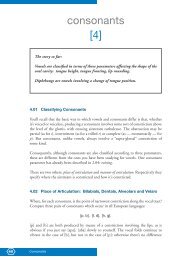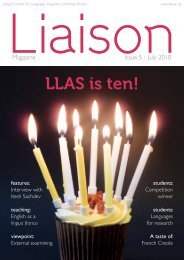PHONETICS MANUAL.indd - HumBox
PHONETICS MANUAL.indd - HumBox
PHONETICS MANUAL.indd - HumBox
Create successful ePaper yourself
Turn your PDF publications into a flip-book with our unique Google optimized e-Paper software.
[tS] [] (see Exercises 71 & 76).<br />
(b) German: [p] [b] [t] [d] [k] [g] [f] [v] [s] [z] [] [ç] [x] [h] [ts] [tS ] [m] [n]<br />
[] [l] [r]<br />
plus, in words borrowed from other languages:<br />
[] (die Passage)<br />
and, in more detailed transcriptions:<br />
[] [] [] [].<br />
(c) Spanish: [p] [b] [t] [d] [k] [g] [f] [] [s] [x] [t] [m] [n] [] [l] [r]<br />
plus, in more detailed transcriptions:<br />
[] [ð] [z] [] [].<br />
Section 5 (Transcription)<br />
Features revealed by the narrow transcriptions (see the works listed in Section 6 for further<br />
information).<br />
French:<br />
(1) The common tendency to pronounce [] and [] with a fronted tongue position, as<br />
[ ] and [ ], so that they come to resemble [ø, œ].<br />
(2) The dental articulation of [t], [d] and [n], as [t] [d], [n]<br />
(3) The various pronunciations of r (see 4.11).<br />
(4) The devoicing of [m] to [m] when a preceding sound is voiceless (isthme).<br />
(5) The insertion of [] to break up groups of consonants. So [fblk] in plus faible<br />
que becomes [fblk].<br />
(6) The omission of [] in certain other circumstances, especially in rapid speech (e.g.<br />
est l(e) plus étendu).<br />
(7) The tendency in rapid speech to make adjacent consonants “agree” in respect of<br />
voicing: thus type de pronounced [tibd] rather than [tipd]. Similarly in l’ouest du<br />
continent. In this case the [t] at the end of ouest may merge with the [d] (oues’du),<br />
causing the [s] to become a voiced [z], so as to match the [d] of du, which now<br />
immediately follows it.<br />
(8) Tendencies (6) and (7) are seen operating together in the case of de in aucun de<br />
ses partenaires: [] is omitted, and [d] devoices to [t] as it now adjoins the voiceless<br />
[s] of ses.<br />
9) The way in which liaison consonants are pronounced as though they<br />
belonged to the following word (which in fact they do, phonetically). So plus<br />
étendu is [ply zetdy].<br />
Answers to Exercises<br />
83






